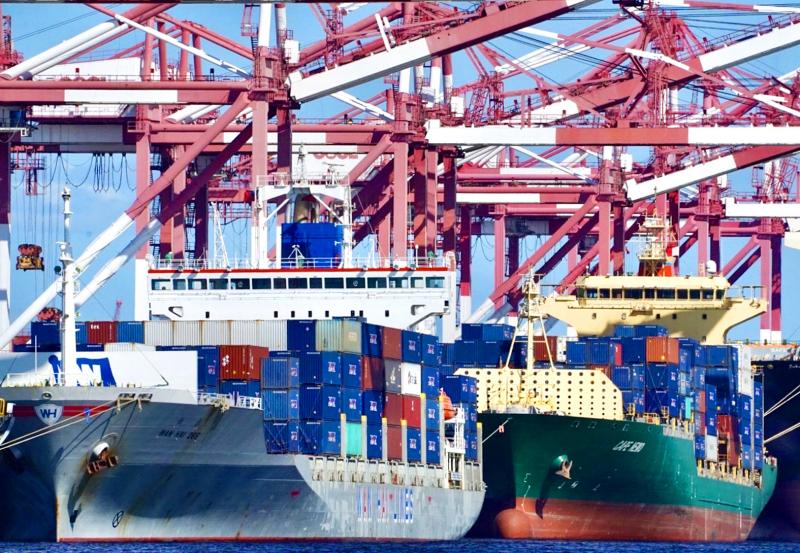Exports last month surged 30.2 percent year-on-year to a record US$41.58 billion, as a global recovery propped up demand in almost all product categories and selling prices increased, the Ministry of Finance said yesterday.
Outbound shipments might again top US$40 billion this month, making the current quarter the strongest in history as the COVID-19 pandemic and digital transformation reshape consumer behavior and product supply chains, Department of Statistics Director-General Beatrice Tsai (蔡美娜) told a news conference in Taipei.
Last month’s “export data are surprisingly impressive and would remain strong this month,” Tsai said, adding that exporters hiked selling prices to reflect rising raw material costs.

Photo: CNA
The unprecedented showing also had to do with holiday demand and delayed shipments from previous months, Tsai said.
Electronics shipments grew 26.6 percent to US$15.93 billion, while exports of information and communications technology products gained 19.5 percent to US$5.69 billion, the ministry’s monthly report said.
Several electronics suppliers have said that they have more orders than they can digest due to component shortages and chaos in the shipping sector.
Exports picked up across the world as rising COVID-19 vaccination rates gave countries confidence to lift lockdowns.
That explained why shipments to Europe swelled 56 percent and inflated 39.2 percent to the US, the report said.
Exports to ASEAN markets jumped 31.2 percent and rose 29.1 percent to Japan, it said.
China also increased purchases of Taiwanese goods by 18.9 percent year-on-year, it said.
However, shipments of optical devices dropped 3 percent, although domestic flat-panel providers said that seasonal price corrections would soon end.
Exports of non-tech products advanced 20 to 164.6 percent, as price hikes benefited mineral products the most, the report said.
Formosa Plastics Group (台塑集團), Taiwan’s largest industrial conglomerate, this week said that sales would weaken in the next three months, with the Lunar New Year to cut working hours and uncertainty escalating due to the quickly spreading Omicron variant of SARS-CoV-2.
Imports spiked 33.8 percent to US$35.86 billion, the second-highest in history, driven by aggressive demand from local semiconductor companies to upgrade and expand capacity with equipment abroad, Tsai said.
Imports of semiconductor capital equipment soared 36.1 percent to US$2.7 billion, offsetting a steep retreat in imports of vehicles and smartphones, the report said.
Taiwan last month had a trade surplus of US$5.71 billion, an 11.1 percent increase from a year earlier.
For the first 11 months of this year, exports expanded 30 percent to US$93.61 billion, while imports grew 33.8 percent to US$87.37 billion, the ministry said.

South Korea’s equity benchmark yesterday crossed a new milestone just a month after surpassing the once-unthinkable 5,000 mark as surging global memory demand powers the country’s biggest chipmakers. The KOSPI advanced as much as 2.6 percent to a record 6,123, with Samsung Electronics Co and SK Hynix Inc each gaining more than 2 percent. With the benchmark now up 45 percent this year, South Korea’s stock market capitalization has also moved past France’s, following last month’s overtaking of Germany’s. Long overlooked by foreign funds, despite being undervalued, South Korean stocks have now emerged as clear winners in the global market. The so-called “artificial intelligence

‘SEISMIC SHIFT’: The researcher forecast there would be about 1.1 billion mobile shipments this year, down from 1.26 billion the prior year and erasing years of gains The global smartphone market is expected to contract 12.9 percent this year due to the unprecedented memorychip shortage, marking “a crisis like no other,” researcher International Data Corp (IDC) said. The new forecast, a dramatic revision down from earlier estimates, gives the latest accounting of the ongoing memory crunch that is affecting every corner of the electronics industry. The demand for advanced memory to power artificial intelligence (AI) tasks has drained global supply until well into next year and jeopardizes the business model of many smartphone makers. IDC forecast about 1.1 billion mobile shipments this year, down from 1.26 billion the prior

People stand in a Pokemon store in Tokyo on Thursday. One of the world highest-grossing franchises is celebrated its 30th anniversary yesterday.

Chinese artificial intelligence (AI) start-up DeepSeek’s (深度求索) latest AI model, set to be released as soon as next week, was trained on Nvidia Corp’s most advanced AI chip, the Blackwell, a senior official of US President Donald Trump’s administration said on Monday, in what could represent a violation of US export controls. The US believes DeepSeek will remove the technical indicators that might reveal its use of American AI chips, the official said, adding that the Blackwells are likely clustered at its data center in Inner Mongolia, an autonomous region of China. The person declined to say how the US government received